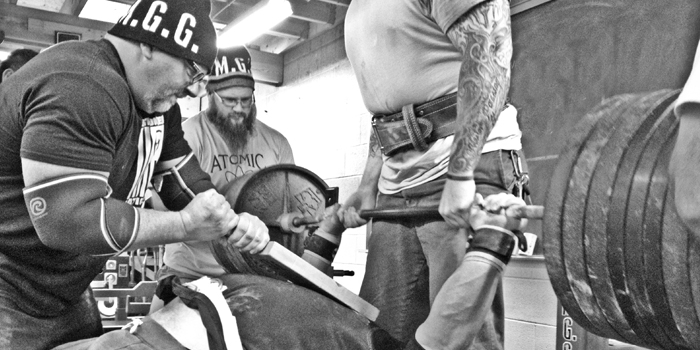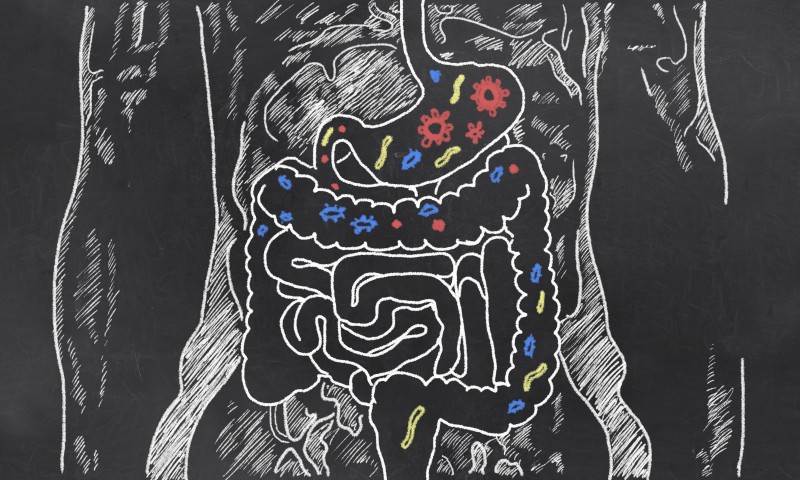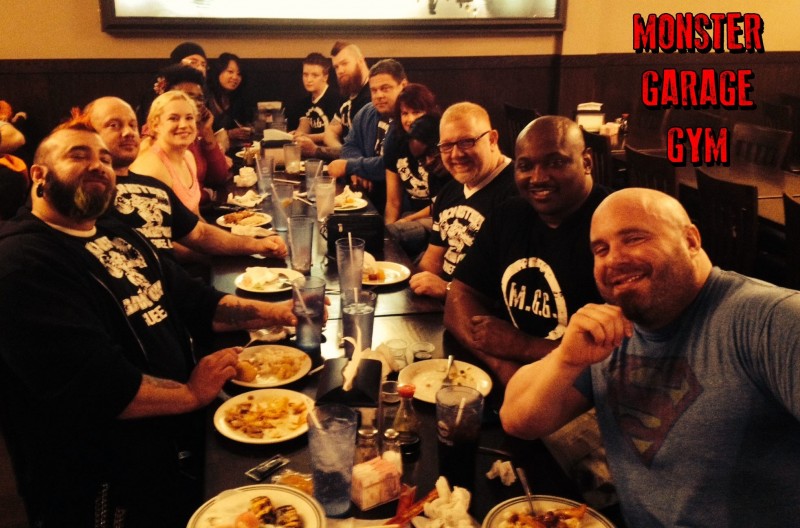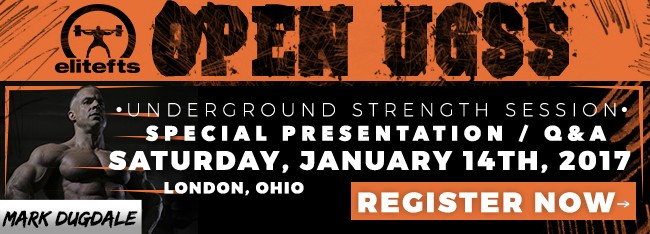
The imagery is already there in your brain. The barbell is at the ready on the squat rack. The plates on either side are enough that you have to add them up, then do a little math to figure out the weight. This is not three plates per side but eight plates per side in addition to some change, and that just doesn’t add up as easily as 315 pounds does.
The bar has a layer of chalk on it from the prior sets, and the bend is very much noticeable under the stress of the weight. The squat rack safeties are in place and the whole gym is watching, because whoever is getting ready to squat this is clearly strong and clearly has the guts to be successful in this sport.
When we talk about the “guts” to be a successful lifter, we picture the above scenario and toss around words like courage, toughness of character, grit, boldness, and audacity. Those traits are commonplace amongst the serious powerlifter.
RECENT: Ten Items for the Retired Powerlifter Who Can't Tie His Shoelaces
What I am referring to is just what the title asks: do you have the guts be a successful powerlifter? Specifically, I am talking about your gut (or in other vernacular, your abdomen, your stomach, the “get in my” belly).
To the layperson, the powerlifting gut, when not in reference to the traits but the anatomy, is that thing that so many lifters tout around as a trophy or that thing to bench from. But the “guts” it takes to be the best powerlifter you can be are the guts that you most likely do not have such familiarity with.
Rather than thinking about the gut or “the belly" as a place where the food goes, only to be sent to the end of the road and out of the body, the educated powerlifter recognizes that the gut is more like an ecosystem — an ecosystem meaning a biological community of interacting organisms in their physical environment.
What? Yes, contrary to how we typically think of our gut, that area is alive, and gut health is paramount to our overall health. Conversely, poor gut health can be the cause of overall ill health if neglected or ignored.
Just like I wrote about Vitamin D3 being an actual hormone that contributes to nearly 3000 gene expressions and is a key nutrient for muscular development and increased strength, the microbiome of the gut mediates gene expressions as well.
A healthy gut, created by a healthy diet, contributes to a complex and healthy microbiome. This means the cells communicate instructions well and thus the body works like it should. A poor diet results in the opposite. Just like we discussed, the true magic of magnesium as it relates to ATP production in the mitochondria and how a healthy diet contributes to an intake of magnesium, a diet that is healthy contributes to the gut’s health, and that has a direct correlation to the overall health of the body. The bottom line is that your body cannot properly respond to the demands on it without all the parts of it working in symbiosis with one another. Said another way, if you are just counting on lifting heavy and eating anything to help you meet your goals, you have just sold yourself short and you will never reach your full potential. Science has demonstrated this to us over and again.
The human brain has evolved since the dawn of man, but the gut? Well, that bad boy is as primitive as it has ever been. Having said that, we have culturally evolved and what we put into the gut has sadly de-evolved. Foods full of preservatives will keep for a long long time. We have all seen those photos of preservative-laden foods that look the same today as they did three years ago. Well, when we consume those foods, those preservatives also cause the food to stay preserved, but now they are being preserved in the critical gut we all take for granted.
The gut plays a role in mental health, physical health, and both of these impact your performance in the gym far more substantially than you can imagine.
Let’s look at a couple of really simple things that can impact your gut, thus your lifts. If you are lacking fiber in your diet, you are missing a key element to gut health. Fiber is not really digested in the body, so when you eat your All Bran cereal, for example, this high source of fiber passes through your GI tract and moves out excess metabolic waste and other excesses. Low fiber means those waste products stay around too long and can get partially reabsorbed into the body, which means the liver, among other things, has to work harder. When this happens, it can’t work at full strength to recover from your training session.
Additionally, high fiber does a great job removing waste that can stress the body and body stress, as we all know, decreases our natural levels of human growth hormone and testosterone. The numbers vary, but an intake of 30 grams per day of fiber is commonly recommended. Get on your fit-app and add up your fiber intake for a day. I think you will be stunned how low it is. If All Bran is not your thing (I have a cup in the morning and a cup in the evening with blueberries and half a banana mixed in), you can exchange it for fruits, veggies, seeds, nuts, beans and legumes.
Keep in mind that when we train we break down the muscle fibers and there are waste products involved in that. The gut needs to work efficiently to remove the waste so our body can respond with strength and hypertrophy, but a polluted gut inhibits that. Why would anyone negate their gut, thus negate their muscular and strength potential?
Okay, back to the microbiome. The average human gut hosts ten times more bacteria than all the human cells in the body. Within that huge number are 400 known species of bacteria. All these tiny but important guests in your gut’s house need to be healthy to function well, as that also equates to a healthy metabolism. So we are talking fat loss and a healthy immune system. In other words, we are talking about being healthy through intense and body-demanding training sessions. This healthy gut also keeps at bay inflammation. Everything is wrong with inflammation in the system, as that is a whole other article.
In this series of articles that we have put out over the past few months, we have detailed how things outside of the gym can impact your training including, sleep and the CPAP, vitamin D3, and magnesium.
- Magnesium and Vitamin D3: Two Neglected Parts of the Power Game
- The Good, the Bad, and the Ugly of Using the Ultimate Performance Enhancer
- Is the CPAP the Ultimate Performance Enhancer?
Gut health is on equal footing with each of those topics. Elitefts.com has the best training and programming articles on the face of the planet, and you read them, implement them and follow them through to fruition. However, for us as lifters, that is the fun stuff. Training at the gym is a blast and even bad workouts are great when you are truly a life-long lifter. Having said that, all the success in your lifting that stems from work you put in at the gym can be compromised, often significantly, by your failures outside of the gym. This is the other critical content that elitefts puts out: the content about things outside of the weight room that will impact your life in the weight room if neglected. Negating gut health in addition to the aforementioned areas we have written about is not acceptable. Let me be blunt, because if I didn’t care, I wouldn’t spend the time compiling research toward this end. That bluntness is this: ignoring your sleep, vitamin D3, magnesium, and gut health is plain old lack of discipline. You will hear lifters talk about being “all in,” but if these areas are lacking, then they are not even close to being “all in.” Squatting, benching, deadlifting — that is pure fun, and we love it. Counting the grams of fiber or IU’s of D3 or milligrams of magnesium, or getting a sleep study — that stuff is often a pain. It can easily be ignored or dismissed as being non-important. Having said that, the question really is, how committed to being a successful powerlifter are you? Do you have the “guts” AND the guts to do so?
Success and truly reaching your lifting potential requires you to be a complete powerlifter, not just someone who puts in the time in the gym. A complete and an individually successful powerlifter works toward his/her goals outside of the gym, at the dinner table, in the kitchen, on the computer doing their research, in their bed getting appropriate sleep, etc.
“I hear you, Eric, but I know this guy and he eats garbage and puts up huge numbers. How do you respond to that?”
I respond this way: imagine how much bigger those numbers would be when complemented by adequate rest, nutrition, gut health, and the like. Perhaps those numbers would not be just huge, but all time numbers. What science tells us without any shadow of a doubt is that it requires more than savagery in the gym to be the best you there is. It requires discipline when away from the gym and the ability to educate oneself to see how gut health, nutrition, sleep, training, programming, hydration and other key aspects work both symbiotically and exponentially with one another to produce bigger numbers — and more importantly, bigger numbers over a long and sustained period of time.
In closing, here are five things you can do immediately to improve your gut health, and thus directly help your muscular development and strength development.
- Consume your fiber. In general, try to consume 15 grams per 1000 calories.
- Consume your fruits and veggies. In Dave Tate speak, “Quit complaining about the f*cking taste and eat your damn fruits and vegetables!”
- Consume adequate protein. You already do this. Moving on.
- Consume your nutrients from REAL FOOD first, and then take your supplements. That is why they are called “supplements.”
- Stay Hydrated. This is crucial for muscle firing and so many other things, but it is an absolute must for your gut health.
Wishing you the best in your training and competitions! Ever onward!













1 Comment